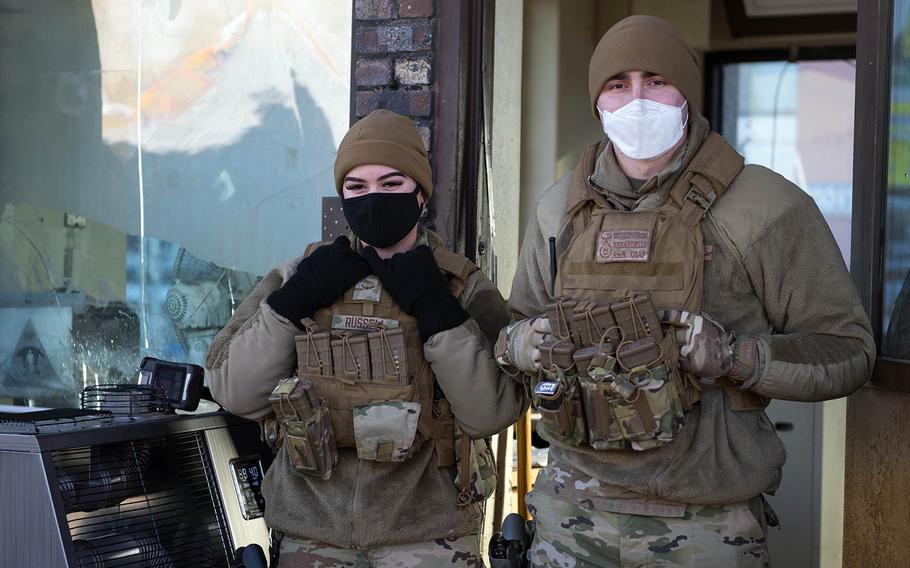
Airmen assigned to the 51st Security Forces Squadron pose for a photo at Osan Air Base, South Korea, Dec. 7, 2020. (Betty Chevalier/U.S. Air Force)
Stars and Stripes is making stories on the coronavirus pandemic available free of charge. See other free reports here. Sign up for our daily coronavirus newsletter here. Please support our journalism with a subscription.
Wearing a mask as protection against the coronavirus is now official Defense Department policy on U.S. military installations and for service members on duty worldwide, according to a memo Thursday from the defense secretary.
Lloyd Austin directed that anyone on a U.S. military base or on duty anywhere other than their homes, including shared outdoor spaces, “will wear masks in accordance with the most current” guidelines from the U.S. Centers for Disease Control and Prevention.
Most, if not all, U.S. installations already mandate mask wear, but Austin left little room for doubt on particulars.
“Individuals must wear masks continuously while on military installations,” he wrote, except when alone in a “floor-to-ceiling” walled office with the doors closed, brief periods while eating and drinking at a safe distance from others, when the mask must be lowered for ID or security purposes and to accommodate an individual with a disability.
The CDC recommends wearing a mask in public settings and around people who don’t live in the same household.
“Masks may not be necessary when you are outside by yourself away from others, or with other people who live in your household,” the agency states on its website.
Some jurisdictions, like the military, set their own, tighter guidelines for wearing masks, the CDC states. And a mask is never a substitute for social distancing; everyone should wear a mask and maintain at least six feet of separation, according to the CDC.
U.S. Forces Japan and U.S. Forces Korea already dictate a mask policy that is generally in line with Austin’s memo, spokesmen for both commands told Stars and Stripes on Friday. Both said their commands are reviewing the memo to make any necessary changes. Both commands imposed mask mandates in April.
In South Korea, anyone on a U.S. installation must wear a mask unless they are exercising or their mission requirements prevent them from doing so, USFK spokesman Col. Lee Peters wrote in an email Friday.
“Mandatory mask wear is part of our core tenets to prevent the spread of the virus,” he said.
Masks “MUST be worn” on every installation in office spaces, commissaries, post exchanges and shopettes, banks, post offices, libraries and other facilities, Peters wrote. He said masks must also be worn outside when the wearers cannot maintain six feet of separation.
Off-post, anyone subject to the status of forces agreement, meaning service members, family members, Defense Department civilian employees and contractors, must abide by laws and regulations set by the South Korean government, Peters said.
“USFK maintains a good record of preventing the spread of virus within our formations, installations and communities,” he wrote.
U.S. Forces Japan has a policy similar to USFK’s in place and looks to its higher headquarters, Indo-Pacific Command in Hawaii, for any changes, USFJ spokesman Gunnery Sgt. Derek Carlson said in an email Friday.
Carlson wrote that “it is safe to assume policy will change to ensure complete compliance” with Austin’s memo.
Once the USFJ receives INDOPACOM guidance, the COVID Operational Planning Team will discuss new policy development, Carlson wrote.
“This does not prevent commanders at the local level from proactively changing their current policy to align with this memo and best protect their members and their mission,” he said.
The CDC recommends wearing masks made of breathable fabric such as cotton, and that have several layers; masks that fit snugly around the nose and chin; and that come with an inside filter pocket.
The CDC recommended non-medical cloth masks to conserve medical grade masks for health care professionals, but N95 masks are sometimes available at base exchanges.
ditzler.joseph@stripes.com Twitter: @JosephDitzler